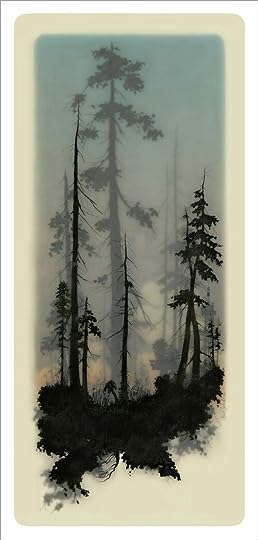What do you think?
Rate this book


154 pages, Paperback
First published August 19, 2016

’I didn’t want to be his eyes on my world. I wanted to be seen. I wanted him to see me with his own eyes. I wanted him to draw me.
‘He'd never understand what Sokcho was like. You had to be born here, live through the winters. The smells, the octopus. The isolation.’
’What I mean is you may have had your wars...but that’s all in the past. Our beaches are still waiting for the end of a war that’s been going on for so long people have stopped believing it’s real. They build hotels, put up neon signs, but it’s all fake, we’re on a knife-edge, it could all give way any moment. We’re living in limbo. In a winter that never ends.’



"We live in a limbo. In a winter that never ends"
Elisa Shua Dusapin’s language is spare, elegant, and richly evocative. The novel is full of the sights, sounds, and smells of this windswept seaside town. Food is a constant presence and fish are everywhere. Her voice is cool and distant, her words deftly chosen to convey intimacy, violence, sensuality, and alienation. The challenge, and the pleasure, of bringing her voice into English lies in retaining that spare elegance without allowing the text to seem flat. The language has to create striking visual imagery but the words themselves must remain unobtrusive. It’s easy to be tempted into using too many words when translating since it’s usually impossible to find an exact equivalent for a key word. Connotations, poetic resonances, cultural associations, all of these can be stubbornly resistant to translation. Dusapin’s prose requires a combination of flexibility and discipline on the part of the translator. All the excess must be trimmed and only the essence allowed to appear on the pageAnd the author brings the story to a satisfyingly enigmatic close.
He’d never understand what Sokcho was like. You had to be born here, live through the winters. The smells, the octopus. The isolation.
–and–
A rubber-gloved hand pointed us in the right direction.
Too much of everything. Too big, too cold, too empty. The clatter of our shoes on the marble slabs rang out.
–and–
Oozing winter and fish, Sokcho waited. That was Sokcho, always waiting, for tourists, boats, men, spring.
All night long the town was entombed in frost. The temperature fell to minus twenty-seven degrees, the first time it had happened in years. Curled up under the covers, I blew on my hands and rubbed them between my thighs. Outside, against the onslaught of ice, the waves struggled to resist, moving ever more slowly and heavily, cracking as they collapsed in defeat on the shoreline. I bundled myself up in my overcoat, the only way I could find sleep.
–and–
The rain hammered down, the sea rising beneath it in spikes like the spines of a sea urchin.
–and–
‘What I mean is you may have had your wars, I’m sure there are scars on your beaches, but that’s all in the past. Our beaches are still waiting for the end of a war that’s been going on for so long people have stopped believing it’s real. They build hotels, put up neon signs, but it’s all fake, we’re on a knife-edge, it could all give way any moment. We’re living in limbo. In a winter that never ends.’
“Oozing winter and fish, Sokcho waited. That was Sokcho, always waiting, for tourists, boats, men, spring.”